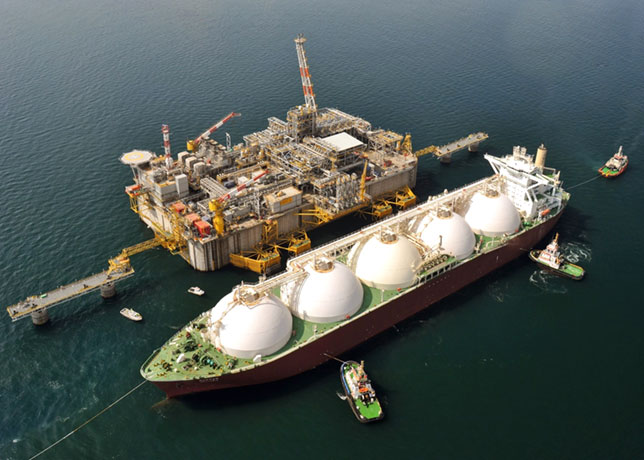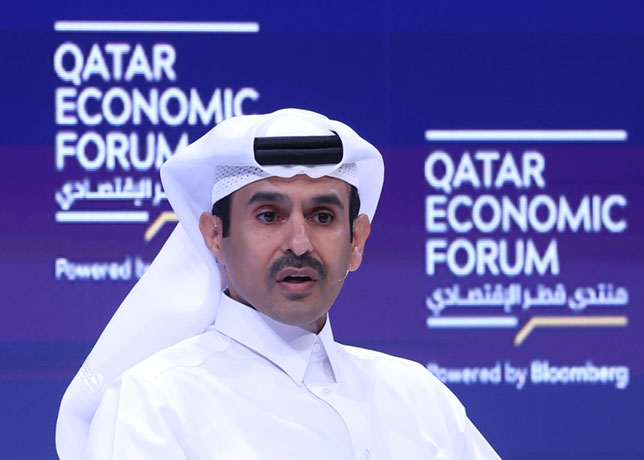
 Saad Al-Kaabi speaks at the Qatar Economic Forum 2024
Saad Al-Kaabi speaks at the Qatar Economic Forum 2024
Qatar’s LNG expansion projects, expected to take the total output to 142 MTPA by 2030, are designed to help meet the growing demand for cleaner energy, driven by economic growth and rising populations and living standards
Driven by a robust long-term global LNG demand outlook, QatarEnergy (QE) is on a mission to double its LNG production capacity, with Europe emerging as a new frontier in the LNG market as an increasing number of countries now look to LNG as a replacement for Russian gas.
Declaring that 'LNG is not going away anytime soon,' QatarEnergy announced another greenfield North Field West (NFW) LNG project in February 2024. The project, which is estimated to have a 16 mtpa LNG production capacity, is an addition to the North Field East (NFE) and North Field South (NFS) projects, which are already underway.
The North Field is the world’s largest single non-associated gas field. NFE, the first phase of expansion, will raise Qatar’s LNG production capacity from its current 77 million metric tons per year (MTPA) to 110 MTPA. The NFS project, the second phase of expansion, will further increase Qatar’s LNG production capacity to 126 MTPA. The third phase, the NFW project, will boost Qatar’s LNG production to 142 MTPA by the end of 2030. Additionally, the company's Golden Pass LNG project in Texas will add an additional 18 MTPA through three production trains, with production expected to begin in 2025.
Saad Al-Kaabi, Qatar's Minister of State for Energy Affairs and the President and CEO of QatarEnergy, said Qatar’s LNG expansion projects are designed to help meet the growing demand for cleaner energy driven by economic growth and rising populations and living standards.
Minister Al-Kaabi said the extensive appraisal drilling and testing have confirmed that productive layers of Qatar’s giant North Field extend towards the west, allowing for the development of a new LNG production project in Ras Laffan.
He also announced the presence of huge additional gas quantities in the North Field, estimated at 240 trillion cubic feet, which raises Qatar’s gas reserves from 1,760 trillion cubic feet to more than 2,000 trillion cubic feet, and the condensates reserves from 70 billion barrels to more than 80 billion barrels, in addition to large quantities of liquefied petroleum gas, ethane, and helium.
The minister said: 'These are very important results of great dimensions that will take Qatar’s gas industry to new horizons, as they will enable us to begin developing a new LNG project from the North Field’s western sector with a production capacity of about 16 MTPA. As such, the State of Qatar's total LNG production will reach about 142 MTPA when this new expansion is completed before the end of this decade. This represents an increase of almost 85% compared to current production levels. With the completion of this project, the State of Qatar’s total hydrocarbon production will exceed 7.25 million barrels of oil equivalent per day.'
QatarEnergy is expected to commence basic engineering works soon to ensure that the planned progress is achieved according to the approved schedule.
DEMAND WILL STAY
During a panel discussion on 'The Next Stage of the Global Energy Transition' at the Qatar Economic Forum, which included Patrick Pouyanné, the Chairman and CEO of TotalEnergies, and Darren Woods, the Executive Chair and CEO of ExxonMobil, Minister Al-Kaabi added: 'If you look at the expectation of having 1.5 billion to 2 billion more people in the next 30 years or so, that means we will need more energy, more power, and even more petrochemicals for materials we use every day. We also need to be fair to that population and make sure they have access to reasonably priced power.'
He stressed that LNG will remain in demand for a very long time, adding that this has been made clear by the G7 as well as by many countries around the world, who have changed their position on moving away from fossil fuels.
ENERGY TRANSITION
Discussing the energy transition, Al-Kaabi said: 'Many promises were made by politicians, who do not really understand the details of how to achieve this transition. And it was driven to a point where it became in vogue, if you will, for everybody to say ‘net zero, environmental, and green’, which got them elected. But now, as reality sets in five or six years later, they say we cannot achieve what we have promised. The problem is that targets were overstretched and could not have been reached anyway.
'As a world leader in the production of liquefied natural gas (LNG), we are adapting our direction and strategic objectives to meet the challenges of the new business environment with greater dynamism, resilience, and efficiency,' he said.
Today, energy derived from hydrocarbons is crucial to every single human being on Earth, and its positive impact on human and social development is immeasurable. Natural gas and other hydrocarbons power homes and industry and accelerate production and innovation. As fuels and feedstocks for advanced materials, hydrocarbons help billions of people find better livelihoods and opportunities. The global energy transition and continued prosperity and security of society hinge on reliable supplies of energy, he said.
'Natural gas is a source of reliable energy for achieving this transition and maintaining prosperous growth. As energy demand grows over the coming decades and we strive to eliminate energy poverty, natural gas in the form of LNG will be essential,' he added.
Qatar's announcement of the NFW project came after the Biden administration's decision to pause approvals for pending and future applications to export LNG from new projects in the US, as well as the US's opposition to the startup of Russia's Arctic LNG Phase 2 project. Regardless of US policies to curb LNG exports, the rosy outlook for global LNG demand growth is a key driver behind Qatar's LNG production capacity expansions and its ambition to expand its footprint in the global LNG market, said a Fitch Solutions report.
It said Europe's struggle to reduce dependence on Russian gas offers significant opportunities for Qatar to expand its LNG production capacities. Europe is emerging as a new market as an increasing number of countries now look to LNG as a replacement for Russian gas. Several new LNG import terminals are being planned or built to accommodate the growth in LNG demand.
Qatar is seeking to expand its footprint in Europe's LNG market, although the continent is currently dominated by the US. Despite the fact that the US joined the global LNG market as recently as 2014, it has overtaken Qatar and Australia to become the largest LNG exporter in 2023, with total exports rising to a record high of 90 MTPA in 2023. European countries rely on steady supplies of LNG from the US, but US policy to pause LNG exports could offer an opportunity for Qatar to expand its market share in the European LNG market, said the report.
'LET'S NOT BE SELFISH'
Speaking at the World Economic Forum’s special meeting on global collaboration, growth, and energy for development in Riyadh, Al-Kaabi highlighted the important issue of access to energy and the need for a fair energy transition, saying: 'There are a billion people who do not have access to basic electricity. There will be anywhere between one and two billion additional people within the next 30 years, who will need access to energy. Therefore, we shouldn’t be selfish and just talk about what we want for our house and forget the neighborhood, if you will.'
Minister Al-Kaabi criticised demonising oil and gas, saying this will not do humanity any good.
He said: 'Demand for oil is going to be there for a very long time. You need petrochemicals that wind farms and solar energy cannot produce, and you also need petrochemical plants to make refined products for a very long time. Gas is going to be needed to power the electricity that is needed for expansion and growth. The most important thing is that we all do it in a responsible manner to make sure that humanity can develop and grow.'
By Sree Bhat









































































